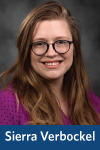Meet Sierra Verbockel, BS, MPA, who’ll be covering the 2019 Social, Behavioral, and Educational Research and Advancing Ethical Research Conferences (SBER19/AER19) as a member of the Blog Squad. Members of PRIM&R’s Conference Blog Squad provide an insider’s view of the conferences by sharing their experience before, during, and after the meeting.
In 2017, research compliance fell into my lap. Little did I know it was exactly what I needed. You see, throughout my education and early career, I often found myself asking “Why?” to my supervisors, instructors and mentors. The response was always the same: “that’s just the way it is” when it comes to policy and procedures. But I never stopped asking why. Entering my master’s program, I found the courage to discover the answers myself. Fast forward two years, and I’m now able to help others ask those burning questions.
I attended my first PRIM&R Conference in April 2019 as part of a professional development grant I was awarded. Prior to that, I familiarized myself with their web resources and webinars to stay abreast on current research administration topics. By attending the 2019 IACUC Conference earlier this year, including the preconference programs and the adjacent NWABR IACUC/IBC Conference, I was able to get the most out of what PRIM&R had to offer. It was so refreshing to see hundreds of people with the same passion for research administration as mine.
Although I loved every minute of it, one of my favorite parts of the conference was picking the brains of others from institutions similar to my own and learning how they tackle change management within a small university. I learned some great tips for research programs at small woodland universities, including initiating difficult conversations when stakes were high. Instituting the first IBC program as a young professional at University of Wisconsin-Steven’s Point (UWSP) was a huge challenge, but the resources I gained from working with PRIM&R allowed me to properly train and incorporate biosafety research compliance throughout the entire institution, with the help of the campus biosafety officer and key research faculty. It has been a wonderful and challenging opportunity to integrate what I take away from PRIM&R with the current practices of my colleagues to work collectively to increase personnel safety and new management practices at my home institution.
I look forward to attending SBER19 and AER19 for the same benefits I gained from attending IACUC19: to make a difference in my institution and community. Since my start at UWSP, I have focused heavily on increasing the amount of biomedical and collaborative research. I look forward to bringing back tips and information that would strengthen our Doctor of Physical Therapy (DPT) program, in addition to our undergraduates studying healthcare professions. I love learning from others, taking their experiences and knowledge, and molding it with my own. That is how we can improve as administrators, by learning from the experts around us. SBER19 and AER19 are the perfect opportunity to come with questions and leave with answers. Not only that but building relationships with other stakeholders across the country will continue to strengthen the net of resources we administrators have for problem solving in a world of ever-changing policies.
Sierra Verbockel, BS, MPA is the Grants and Research Associate at University of Wisconsin (UW)-Stevens Point. She has been working in research administration since 2017, beginning as a research compliance assistant at UW-Oshkosh. She also has experience in grants administration. As a former student of UW-Oshkosh, she developed an interest in research, eventually conducting her own research studies on differential association theory.
Sierra achieved her master’s degree in Public Administration with an emphasis in Nonprofit Management and Leadership in addition to a Baccalaureate degree in Human Services Leadership and Criminal Justice. Her research interests include community organization and development, employment-education mismatch, generational differences in the workplace, and emotional intelligence. Those interests carried into her career, where she works to make a difference in the lives of her colleagues as UWSP moves toward a more inclusive environment. She enjoys learning from those around her and creating new, more efficient ways of being successful-both as an individual person and as a member of the UWSP collective.


No comments! Be the first commenter?